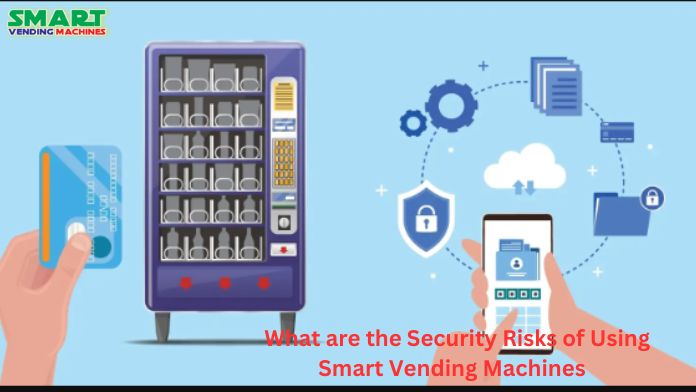Smart vending machines have quickly gained popularity across some retail industries, offering consumers a modern and convenient way to access products. These machines seamlessly integrate technology into the shopping experience, providing a hassle-free and automated process. However, along with these benefits, come potential security hazards that must be addressed. What are the Security Risks of Using Smart Vending Machines? In this article, we will explore the security hazards associated with using smart vending machines and discuss the proactive measures that can be taken to mitigate them
Understanding Smart Vending Machines
While smart vending machines can enhance operational efficiency by offering valuable insights into consumer behavior and inventory management, the utilization of these insights brings about security risks concerning data privacy and potential misuse.
How Smart Vending Machines Work
Smart vending machines integrate diverse technologies, including touchscreens, sensors, cameras, internet connectivity, and embedded computers. Users engage with the machine’s interface for selections and transactions, after which the device dispenses the chosen item and handles payment. Nonetheless, this intricate interconnectivity introduces potential vulnerabilities in the system’s security.
What are the Security Risks of Using Smart Vending Machines
A variety of advantages, including remote monitoring and customized client interactions, are provided by smart vending machines. However, they also put users at risk for some security issues.
Data Breaches and Privacy Concerns

Smart vending machines often gather and retain customer data, encompassing purchase records and payment details, while also facilitating contactless payments. Inadequate security measures can render this data susceptible to cyberattacks, thereby compromising customer privacy. Despite their sophisticated inventory management features, these machines can inadvertently expose valuable data to potential breaches and misuse if robust security protocols are not upheld. Machine learning can analyze large amounts of data and detect patterns that might indicate fraudulent activities.
Maintaining customer trust becomes challenging when security risks such as data breaches and payment vulnerabilities are associated with the use of smart vending machines. Utilizing inadequate security tools can allow unauthorized access to data analysis, potentially leading to financial fraud and identity theft.
Malware and Hacking Threats
Due to their internet connectivity, smart vending machines are susceptible to malware and hacking attempts, compromising their secure operation. Cybercriminals may exploit software vulnerabilities to gain unauthorized access, potentially disrupting operations or assuming control over the system’s functionality.
Remote Attacks
Remote attacks can compromise sensitive data and lead to financial losses, making cybersecurity crucial in safeguarding both personal information and money.
Hackers can remotely target smart vending machines and manipulate their functioning or gain access to private information. This might result in product tampering, illegal transactions, or even the system being used to disseminate malicious content.
Lack of Encryption
The lack of encryption exposes financial transactions to potential breaches, risking the unauthorized access and theft of money.
Data sent between the Smart vending machine and the backend systems may be exposed if not sufficiently encrypted. Additionally, due to a weakening of transaction and communication security, it is easier for attackers to intercept sensitive data.
Physical Tampering

Minimizing physical contact through smart vending machines can enhance hygiene, but it also introduces security risks tied to remote hacking and unauthorized access.
Smart vending machines are prone to physical tampering, which allows attackers to access the machine’s internal workings. As a result, there may be theft, damage, or equipment placement to syphon credit card data.
Inadequate Authentication
Inadequate authentication protocols for vending machine access can leave systems vulnerable to unauthorized manipulation and compromise.
Only authorized people may gain access to the machine’s administrative controls if authentication procedures are adequate or nonexistent. Unauthorized alterations, including raising pricing or turning off security elements, can result from this.
Unsecured Wi-Fi Connections
Smart vending machines often rely on Wi-Fi connections as a prevalent communication method. Inadequate security issues on these connections could render them vulnerable to interception of transmitted data by malicious actors. This could potentially lead to the compromise of consumer information. To prevent such risks, it’s crucial to implement robust security protocols, as recommended by the security team.
Supply Chain Vulnerabilities
Ensuring a seamless customer experience, the supply chain for smart vending machines engages various stakeholders, ranging from manufacturers to software developers. Any disruptions along this chain have the potential to introduce vulnerabilities into both the hardware and software components, thereby elevating the risk of security breaches. Throughout this supply chain, human interaction emerges as a pivotal factor in upholding the system’s overall integrity and security measures.
Insider Threats
Guarding against insider threats involves not only monitoring employees but also implementing robust vending machine security measures to prevent unauthorized access and potential sabotage.
Lack of Regular Updates
Regular software updates are necessary to fix any vending machine’s code vulnerabilities, making it vulnerable to known exploits and attacks.
Understanding the Impact of These Risks
The security hazard associated with smart vending machines can have far-reaching consequences:
Financial Loss: Users and operators could suffer financial losses due to fraud, theft, or unauthorised access to payment information.
Privacy Violation: Improper handling of QR codes may result in privacy breaches, enabling malicious exploitation of personal information and unauthorized access to user data.
Reputation Damage: The involvement of vending businesses in security breaches can lead to reputational damage and customer mistrust, highlighting the importance of preventive measures such as surveillance cameras.
Operational Disruption: Vending operators may face disruptions in the normal operation of machines due to hacking or malware attacks, leading to downtime and potential revenue loss.
Mitigating Smart Vending Machine Security Risks

To mitigate the security hazard associated with smart vending machines and their smart systems, consider implementing the following safeguards and best practices:
Strong Encryption
While keeping track, make sure that robust encryption standards are applied to secure all data exchanged between the Smart vending machine and backend systems.
High-security mechanical cylinders can help deter thieves who attempt to quickly grab cash from the machine. Encrypted contactless Payments Customers can use their preferred payment method, be it credit cards, mobile wallets, or contactless payments, to grab their favourite snacks or beverages swiftly.
Data Minimization
They can connect to inventory management software, CRM systems, and analytics platforms, enabling operators to have centralised control and real-time visibility on sales, inventory, and customer behaviour.
Regular Software Updates
Consistently update the software and firmware of the vending machine to tackle identified vulnerabilities and apply the most recent security patches. By doing so, you can significantly reduce the potential risks associated with security breaches.
Multi-factor Authentication
Multi-factor Authentication enhances security by requiring multiple forms of verification, such as passwords and biometrics, before granting access, and adding strong locks to digital fortresses.
It is crucial to take immediate action against unauthorized access attempts.
Secure Wi-Fi Connections
To enhance security in smart vending machines, it’s vital to establish secure Wi-Fi connections, adding an extra layer of protection against potential cyber threats
Adopting data minimization practices in the vending machine business helps reduce privacy risks by collecting only essential customer information, enhancing overall security.
Employee Training
Comprehensive employee training is essential to mitigate the security hazards associated with using IoT devices like smart vending machines.
Physical Security Measures
Implementing robust vending machine security is essential to safeguard against physical tampering and unauthorised access.
FAQ
Are smart vending machines completely secure?
While smart vending machines offer convenience, they are not completely immune to security hazards. It’s important to stay vigilant and follow security best practices when using or operating these machines.
How often should smart vending machines be updated?
Smart vending machines should be updated regularly, ideally when the manufacturer releases data updates or security patches. This helps protect against known vulnerabilities.
Can hackers control the products inside the machine?
In some cases, hackers could gain control over a smart vending machine’s operations and potentially distribute incorrect products or steal inventory. This is why robust security incidents are crucial.
Are biometric features like facial recognition safe to use in vending machines?
While biometric features offer convenience, they can also pose privacy hazards if not properly secured.
How can users protect themselves when using smart vending machines?
To stay safe, people can pick safer vending machines. They should avoid ones that seem strange or too old, and they should use safe ways to pay.
Conclusion
Smart vending machines offer great convenience but also raise security worries. These machines match what customers like, so we need to think carefully. People who use the machines and the ones who run them can enjoy the good parts of this tech. They should also protect important information by knowing the risks and using strong security. Being open to new ideas means knowing, being watchful, and taking care.

